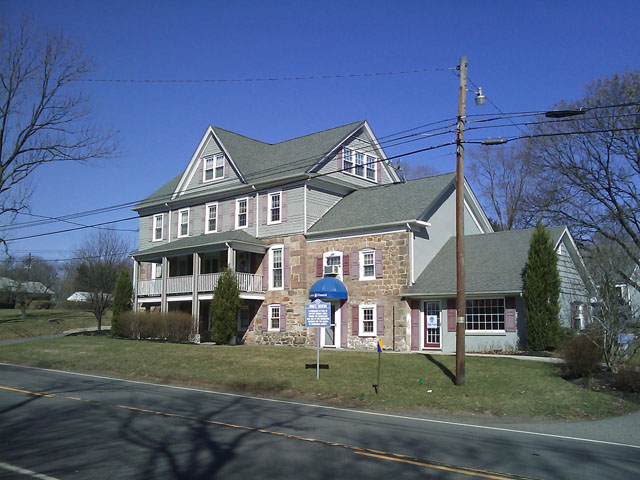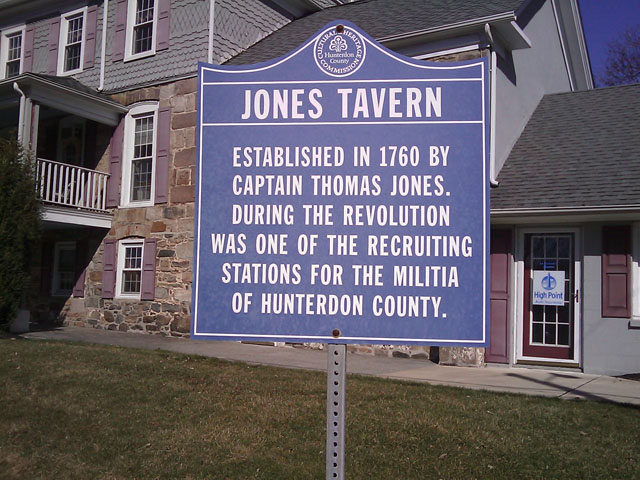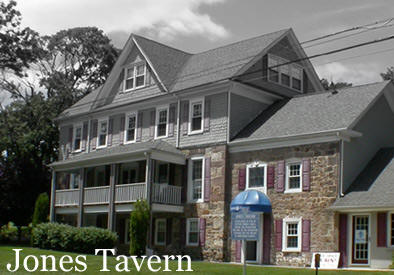Annandale, New Jersey History
Home | Annandale History | Picture Gallery
|
Jones
Tavern
Jones Tavern - Established in 1760 by Captain Thomas Jones. During the Revolution was one of the recruiting stations for the militia of Hunterdon County.
Link - Google Map Street View Thomas Jones opened a tavern and built a farmhouse along the Easton-Brunswick Road in Beaver Brook around 1760. Jones Tavern became a center of revolutionary activity and a militia recruiting station, with Jones rising to the rank of Captain. Captain Jones helped Daniel Bray of Amwell gather and hide the Durham boats later used by General George Washington to cross the Delaware River from Pennsylvania to Trenton in 1776. After midnight on June 24, 1776, John Vought (son of Christoffel Vought), Joseph Lee and a group of about 25 loyalists armed with clubs raided the tavern house of Thomas Jones, a longtime Vought friend and close neighbor. The group beat Captain Jones, threatened his family and stole money from the tavern bar. After signing, copies of the Declaration of Independence were sent out to be read to the populace. It soon made it to Beaver Brook where it was read from the balcony of Jones Tavern. On March 11, 1841, at a meeting held in the tavern, which was owned by John Wert, the township was carved out of the southern portion of Lebanon Township. It took it's name, Clinton, from the largest settlement within its borders. Jones' Tavern (From Charles S. Boyer's book Old Inns and Taverns in West Jersey) Captain Thomas Jones is designated as an innkeeper at Clinton, in old Lebanon Township, as early as 1760 and continued to keep tavern until 1787 or 1788, although not continuously. The Tory element in Hunterdon County was quite active, especially during the early years of the Revolution, and more or less openly "confederated for the purpose of opposing the measures of the Continental and Provincial Congress." Because of the prominent part which Captain Jones had taken in organizing the militia, they broke into and robbed his house and subjected his family to many indignities. The Provincial Congress took cognizance of these acts and, on June 26, 1776, ordered the militia, under Lieutenant Colonel Ten Eick and Major Berry to apprehend some twenty-six persons engaged in these riots. During the Revolution, Jones' Tavern was one of the recruiting stations for the militia of Hunterdon County and was an important place in this part of the county. Captain Jones was one of the officers delegated to secure all of the boats on the upper waters of the Deleware and Lehigh Rivers and hide them behind the islands on the Pennsylvania side of the river. This movement, at the time, intended to prevent their falling into the hand of Lord Cornwallis and being used by him to ferry his troops across and pursue the retreating American army. These were the same boats which Washington used on his famous crossing on Christmas night 1776. A number of sales of properties of persons convicted of disloyalty were held "at the house of Thomas Jones" in 1779 and he had the satisfaction of seeing some of those who had plundered him, a few years before, brought to bay. Of later proprietors of this tavern, we have James Anderson, George Henry and Peter Fisher. Annandale Taverns (From Charles S. Boyer's book Old Inns and Taverns in West Jersey) At Annandale, midway between Clinton and Lebanon, on the Easton and New Brunswick Turnpike, Samuel Lippincott had a tavern, in 1762, which was "upwards of Eight Miles from John Farneswoth's [Hickory Tavern], one way and about four miles from McKay's Tavern [at New Hampton] the other." In 1780, Jonathan Forman became the landlord and was succeeded by John Covenshoven in 1785. Four years later Barret Gulick was keeping the house. In 1797, John Anderson applied for a license for another house and stated that ther was no other tavern nearby "except a small inconvenient one at this place which experience Hath Shown is not (as many say) in any manner Calculated to entertain Travellers." Because of its situation many travellers "are forced to be Billeted out with the neighbours in order to be supplied with Lodging and other accomodations." Thus did one tavern keeper belittle his rival. The location of the old inns cannot now be possitively made. |


